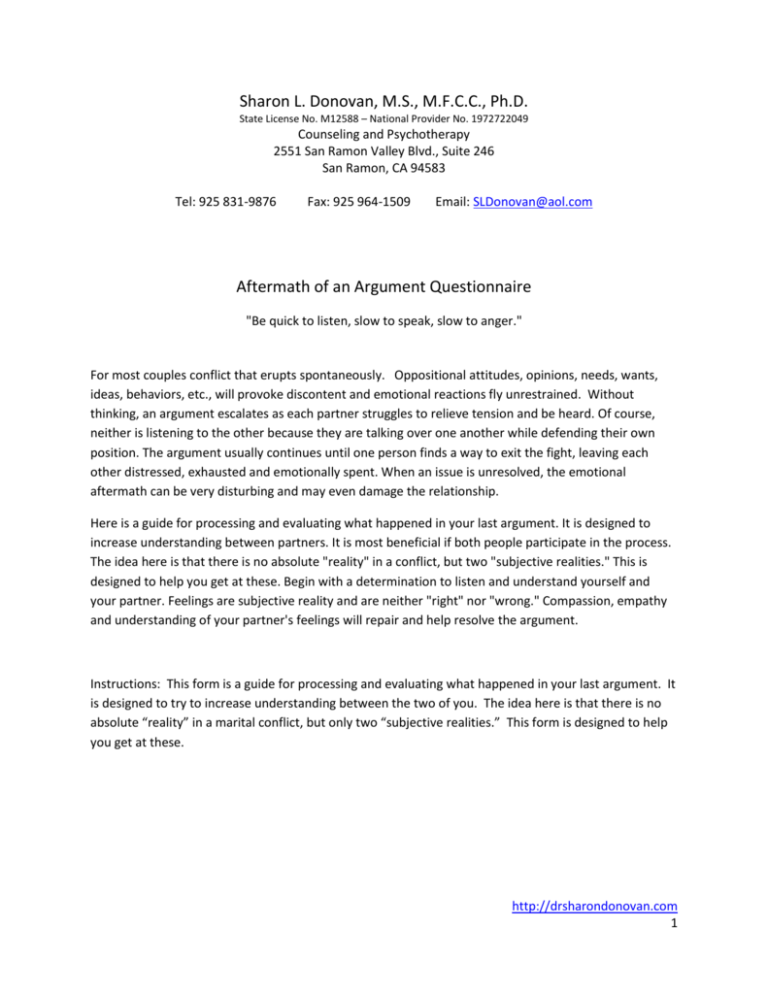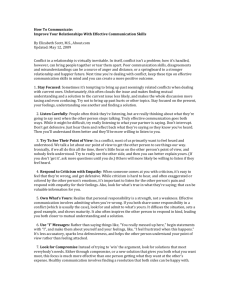Aftermath of an Argument Questionnaire
advertisement

Sharon L. Donovan, M.S., M.F.C.C., Ph.D. State License No. M12588 – National Provider No. 1972722049 Counseling and Psychotherapy 2551 San Ramon Valley Blvd., Suite 246 San Ramon, CA 94583 Tel: 925 831-9876 Fax: 925 964-1509 Email: SLDonovan@aol.com Aftermath of an Argument Questionnaire "Be quick to listen, slow to speak, slow to anger." For most couples conflict that erupts spontaneously. Oppositional attitudes, opinions, needs, wants, ideas, behaviors, etc., will provoke discontent and emotional reactions fly unrestrained. Without thinking, an argument escalates as each partner struggles to relieve tension and be heard. Of course, neither is listening to the other because they are talking over one another while defending their own position. The argument usually continues until one person finds a way to exit the fight, leaving each other distressed, exhausted and emotionally spent. When an issue is unresolved, the emotional aftermath can be very disturbing and may even damage the relationship. Here is a guide for processing and evaluating what happened in your last argument. It is designed to increase understanding between partners. It is most beneficial if both people participate in the process. The idea here is that there is no absolute "reality" in a conflict, but two "subjective realities." This is designed to help you get at these. Begin with a determination to listen and understand yourself and your partner. Feelings are subjective reality and are neither "right" nor "wrong." Compassion, empathy and understanding of your partner's feelings will repair and help resolve the argument. Instructions: This form is a guide for processing and evaluating what happened in your last argument. It is designed to try to increase understanding between the two of you. The idea here is that there is no absolute “reality” in a marital conflict, but only two “subjective realities.” This form is designed to help you get at these. http://drsharondonovan.com 1 Answer each item, filling out the form individually. Then discuss with your partner how you filled out each item. How you felt Negative Feelings A Great Deal Definitely A Little Not at All During the argument I felt: 1. Defensive 2. Hurt 3. Excluded 4. Angry 5. Sad 6. Misunderstood 7. Criticized 8. My partner didn’t like me 9. Afraid 10. Worried. 11. I was right and my partner was wrong 12. Out of control 13. Righteously indignant 14. Unfairly picked on 15. Unappreciated 16. 17. 18. 19. 20. 21. 22. 23. 24. 25. 26. 27. 28. 29. 30. Unattractive Neglected Disgusted. Disapproving Morally outraged Taken for granted Like leaving Overwhelmed with emotion Disrespected Powerless I had no influence My opinions didn’t matter Confused I had no idea what I was feeling Other feelings: (write in) Calm yourself. The next steps in the resolution process cannot happen easily unless you have first calmed yourself down physically. Here are some steps to self soothing: • Take a deep breath, stare at something aesthetic, go for a walk or run, hit golf or tennis balls, listen to music, read a book, watch TV, play computer games, or any activity that is a temporary distraction. • Relax your muscles; lower shoulders, soften stomach, unclench fists, open jaw, etc. • Count to 100 and get a grip on your feelings. • Let go of the negative and destructive thoughts that feed more distress. • Let go of rigid beliefs and expectations. • Allow a minimum of 20 to 30 minutes to pass before attempting the rest of the resolution process. http://drsharondonovan.com 2 Summarize in writing your subjective reality in this argument. Writing out your subjective perspective helps clarify your feelings and thoughts. Putting your reactions into a concrete form makes it easier to manage, repair and/or resolve the disagreement. Summarize in writing your understanding of your partner's subjective reality in this argument. This helps to recognize your partner's feelings and thoughts. When arguing most couples have no idea of what the other person is saying because they are focused solely on expressing themselves and literally don't hear the other person. If you don’t want to write out your subjective reality, use a digital recorder and record your thoughts and feelings. Listen to it several times to clarify your thoughts and feelings. Then record your understanding of your partner’s subjective reality. Listen to this several times until you understand clearly the thoughts and feelings of your partner. Is there any part of your partner's subjective reality that makes some sense to you? If so, then you are ready to discuss this. If not, you may need to calm down further. Go back and calm down some more. Admit your role. In moving from a defensive, critical posture, there is a need to first understand your part in the argument. It is natural for each of us to make the fundamental error that the fight was completely your partner's fault. Actually arguing is a cycle of reactive emotions with both partners contributing to the upheaval. What is necessary is to be able to move both of you out of the fight pattern into a more productive interaction. This begins by each of you admitting some role (however slight at first) in creating the argument. Answer the following about your role in the argument: 1. I have been very stressed and irritable lately. 2. I have not expressed much appreciation toward my partner. 3. I have taken my partner for granted. 4. I have been overly sensitive lately. 5. I have been overly critical. 6. I have not shared much of my inner world. 7. I have not been emotionally available. 8. I have turned away in disappointment. 9. 10. 11. 12. 13. 14. 15. 16. 17. 18. 19. I have been depressed. I have been upset easily. I have had a chip on my shoulder lately. I have been feeling a bit like a martyr. I have not been very affectionate. I have been controlling. I have been uncooperative I have been sarcastic. I have been unreasonable. I have not made time for us. I have not been a good listener. http://drsharondonovan.com 3 20. I have been stressed and frustrated. 21. I have been overworked and unable to leave it behind when I am with my partner. 22. I have been disgruntled. 23. 24. 25. 26. 27. I have been reclusive. I have been depressed. I have been unhappy. I have been demanding. Other: Set aside some time to share these subjective realities. Make a strong commitment that when one person is talking the other won't interrupt, argue, disagree, contradict, defend, or blow up. Begin by deciding who will go first, and then take turns speaking about the same issue. The listener is to hear the feelings and thoughts from the other person's perspective and try to gain an understanding of their subjective reality. It is essential that each of you attempt to give some credence to your partner's subjective reality without negative judgment. Talk about each other’s perspective without starting the argument again and reach for empathy, compassion and understanding. Repair and Resolve. How can you make this better in the future? What is your request for change? What is their request? It is easier to start here: What one thing could your spouse do differently? It is harder to do this: What one thing could you do differently? Quick Tips: State your thoughts and feelings: “I thought you were coming home at 6:30 p.m. and I was disappointed and hurt when you didn’t call to let me know you would be late. “ Request a change: “Would you call me if you are going to be later than 15 minutes from the time we agreed upon?” Responding partner: “You thought I was going to be home by 6:30 p.m. and you were upset that I didn’t call you and let you know I would be late. I may have given you the wrong time since I had a scheduled meeting that didn’t end until 8:00 p.m.” Acknowledge Feeling and Propose Solution: “I am sorry you were disappointed and hurt when I didn’t come home on time. I’ll try to make sure I tell you my schedule so you won’t feel upset.” Then let the matter end. http://drsharondonovan.com 4







